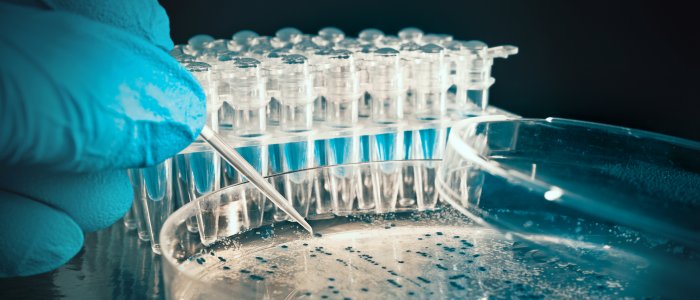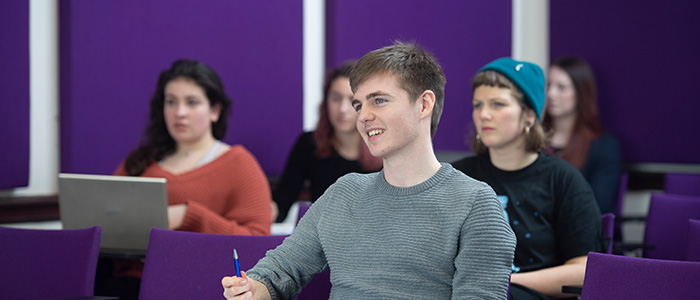Biochemistry & Biotechnology PhD/iPhD/MSc (Research)

Our research aims to answer fundamental questions about how cells and organisms work at the molecular and biochemical level. We study the structures and properties of DNA, RNA and protein molecules, and how these molecules interact within cells to form complex functional networks. We are also working towards applications of our knowledge to address important real-world problems.
- PhD: 3-4 years full-time; 5 years part-time;
- IPhD: 5 years full-time;
- MSc (Research): 1 year full-time; 2 years part-time;
Research projects
+++
Dissecting how and why old mitochondria produce more Reactive Oxygen Species
Supervisors: Alberto Sanzmontero and Kostas Tokatlidis
Project description: Ageing is one of the most important biomedical challenges humanity will confront during the 21st century. Our laboratory studies how and why we age and which role the cell's powerhouses (named mitochondria) play in ageing. Our final goal is to develop therapies to prevent, delay or reverse human ageing. The accumulation of dysfunctional mitochondria that produce high levels of Reactive Oxygen Species (mtROS) is one of the few hallmarks of ageing conserved across evolution. We have learned the consequences of the pile-up of defective mitochondria, i.e., oxidative damage and disruption of redox signalling. However, we ignore how or why the former happens. In the past, our laboratory has demonstrated that Drosophila melanogaster flies require mtROS signalling to adapt to stress correctly [1].
In response to stress, fly mitochondria produce high levels of mtROS for a short period [2]. Recently, we have shown that aged mitochondria lose the capacity to respond to stress with ROS signals, and instead, they produce continuously high levels of ROS [3]. This project aims to dissect how and why old mitochondria produce more ROS than young mitochondria in detail.
The student will work with the model organism Drosophila melanogaster in a project with two clear aims:
- Firstly, the student will investigate: "how do old mitochondria produce more ROS"? The aim is to dissect how old mitochondria produce mtROS using a combination of hypothesis and non-hypothesis methods
- Secondly, the student will interrogate: "why do old mitochondria produce more ROS"? Here the student will use state-of-the-art technology to modify the fly epigenome testing if this affects the way mitochondria produce ROS.
Techniques
To complete the PhD, the student will learn different techniques and methods from various disciplines such as cell and molecular biology, bioinformatics, genetics and physiology. More importantly, the student will learn to generate relevant hypotheses in the field of ageing and test them using lifespan experiments taking advantage of the short lifespan of fruit flies.
References
- Mitochondrial ROS Produced via Reverse Electron Transport Extend Animal Lifespan. Scialò F, Sriram A, Fernández-Ayala D, Gubina N, Lõhmus M, Nelson G, Logan A, Cooper HM, Navas P, Enríquez JA, Murphy MP, Sanz A. Cell Metab. 2016 Apr 12;23(4):725-34. doi: 10.1016/j.cmet.2016.03.009.
- Mitochondrial complex I derived ROS regulate stress adaptation in Drosophila melanogaster. Scialò F, Sriram A, Stefanatos R, Spriggs RV, Loh SHY, Martins LM, Sanz A. Redox Biol. 2020 May;32:101450. doi: 10.1016/j.redox.2020.101450.
- ROS signalling requires uninterrupted electron flow and is lost during ageing in flies Graham C, Stefanatos R, Yek AEH, Spriggs RV, Loh SHY, Huerta-Uribe A, Zhang T, Martins LM, Maddocks ODK, Scialo F, Sanz A
- bioRxiv 2021.08.18.456795; doi: https://doi.org/10.1101/2021.08.18.456795
---
+++
Exploring the structure and function of protein complexes by high-resolution cryo-EM
Supervisor: Paula Dafonseca
Outline & aim: Highly specialised protein complexes are critical regulators of cell division and homeostasis. The full understanding of the functional mechanisms of such complexes requires an in-depth knowledge of their structural organisation, which we study primarily by high resolution cryo-electron microscopy (cryo-EM) and single particle analysis. By resolving protein complexes in different functional states, representing snapshots of the complex in action, we aim at gaining detailed knowledge of their functional and regulatory mechanisms.
We also aim at obtaining information to guide on how to specifically target those complexes for therapeutic use. The structural data obtained is combined with further biochemical and biophysical information for a full functional characterisation.
Techniques
Our work focuses on high-resolution cryo-EM and single particle analysis, together with protein purification and biochemical/biophysical characterisation.
References
- Kišonaitė, M., Afanasyev, P., Tafilaku, J., Toste Rêgo, A., da Fonseca, P.C.A. (2021) “New insights into the human 26S proteasome function and regulation”, deposited online ahead of publication, bioRxiv preprint doi: 10.1101/2021.10.03.462214
- Morris, E.P. and da Fonseca, P.C.A. (2021) “How to Build a Proteasome”, Nat. Struct. Mol. Biol. 28: 409–410.
- Toste Rêgo, A. and da Fonseca, P.C.A. (2019) “Cryo-EM analysis of fully recombinant human 20S and 20S PA200 proteasome complexes”, Mol. Cell, 76: 138-147.
- Morris, E.P. and da Fonseca, P.C.A. (2017) “High resolution cryo-EM proteasome structures in drug development”, Acta Crystallogr. D Biol. Crystallogr., 73: 522 533.
- Li, H., Bogyo, M., da Fonseca, P.C.A. (2016) “The cryo-EM structure of the Plasmodium falciparum 20S proteasome and its use in the fight against malaria”, FEBS J., 283: 4238 4243.
- Li, H., O’ Donoghue, A.J., van der Linden, W.A., Xie, S.C., Yoo, E., Foe, I.T., Tilley, L., Craik, C.S., da Fonseca, P.C.A., Bogyo M. (2016) “Structure- and function- based design of Plasmodium-selective proteasome inhibitors”, Nature, 530: 233 236.
- da Fonseca, P.C.A. and Morris, E.P. (2015) “Cryo-EM reveals the conformation of a substrate analogue in the human 20S proteasome core”, Nat. Commun., 6:7573.
---
+++
Mechanisms and applications of DNA site-specific recombinases
Supervisor: Marshall Stark
Outline & aim: Site-specific recombinases are enzymes that promote rearrangements of DNA molecules, by cutting and rejoining DNA strands at precise places within short target sequences (sites). For example, a specific piece of DNA can be cut out of a larger molecule, or its orientation can be reversed. Our research group aims to understand in detail how recombinases catalyse these reactions, and how they are controlled. To do this we use high-resolution structural data and advanced techniques for laboratory analysis. Site-specific recombinases have tremendous potential as tools for manipulating DNA in the fields of biotechnology, synthetic biology and gene therapy. We are investigating how to engineer “designer recombinases” that are suitable for these purposes, and how to use them for novel applications.
The aim of the research project will be to advance our understanding in one of the areas outlined above. For example, the project might be an investigation of the mechanism of DNA strand cutting and rejoining, using novel “single-molecule” methodologies, or to develop novel designer recombinases suitable for targeting specific genes in a living organism for deletion or modification.
Techniques
- analysis of high-resolution structures
- protein expression, purification and biochemistry
- methods for manipulation of DNA in E. coli
- cloning, sequencing, sequence analysis
- synthetic biology
- novel methods for gene assembly
- advanced methods for analysis of protein-DNA complexes, including single-molecule methods
References
- Olorunniji, F.J. Rosser, S.J. and Stark, W.M. (2016) Site-specific recombinases: molecular machines for the Genetic Revolution. Biochem. J. 473, 673-684.
- Olorunniji, F.J. et al. (2017). Control of serine integrase recombination directionality by fusion with the directionality factor . Nucleic Acids Res. 45, 8635-8645.
- Proudfoot, C., McPherson, A.L., Kolb, A.F. and Stark, W.M. (2011) Zinc Finger recombinases with adaptable DNA sequence specificity. PLoS ONE 6, e19537.
---
IPhD self-funded projects (November-April)
Our Integrated PhD combines an MSc and PhD project in a 1+3+1 format.
You can select from the below projects and indentify your chosen MSc from the options listed on the project.
Please note that you can apply for the below PhD projects outwith the IPhD route.
+++
Structural systems biology of Staufen1:RNA transactions
Supervisor: Laura Spagnolo
MSc choices: Chemical Biology [MSc], Stem Cell Engineering for Regenerative Medicine [MSc], Biotechnology [MSc], Biomedical Sciences [MSc]
Outline: Since its discovery, Staufen1 has been studied for its involvement in a diverse set of aspects of RNA metabolism, ranging from RNA localisation to decay. Given its pivotal role in cellular RNA metabolism, several studies have explored the mechanistic impact of Staufen1 in a wide variety of cell functions ranging from cell growth to cell death, as well as in various disease states. This PhD project aims to identify the molecular mechanism governing the functions of Staufen1 protein, using our unique expertise in the structural and quantitative biology of protein:nucleic acid complexes, track record on Staufen1 structural biochemistry, and access to beyond-state-of-the-art technology.
To gain quantitative molecular knowledge on the formation of Staufen1:RNA complexes, this project will focus on the detailed individual analysis of Staufen1:RNA complexes in vitro; as well as on gathering detailed information of such assemblies combining light and electron microscopy approaches.
Techniques
- Gene cloning, Protein over-expression purification, biochemical and cellular assays
- Reconstitution of multi-protein and protein:RNA complexes
- Assay development
- Cryo-electron Microscopy
- SAXS
- FRET; FRET-FLIM
- Super-resolution microscopy
---
+++
The molecular basis of cell self-renewal and pluripotency in embryonic stem cells
Supervisor: Laura Spagnolo
MSc choices: Chemical Biology [MSc], Stem Cell Engineering for Regenerative Medicine [MSc], Biotechnology [MSc], Biomedical Sciences [MSc]
Outline: Self-renewal and pluripotency are the main characteristics of embryonic stem cells (ESCs). Nanog is the key transcription factor that controls both self-renewal and pluripotency of ESCs.
The aims of this project are to understand on a biochemical and molecular level how Nanog self-assembles and binds to DNA. This project will involve expressing and purifying Nanog-containing macromolecular complexes, developing protocols for studying their three dimensional structure, and designing biophysical characterisation experiments (in both single molecule and ensemble setups) to unravel the molecular determinants of Nanog functions.
Techniques
- Gene cloning, Protein over-expression purification, biochemical and cellular assays
- Reconstitution of multi-protein and protein:DNA complexes
- Assay development
- Cryo-electron Microscopy
- SAXS
- FRET; FRET-FLIM
- Super-resolution microscopy
---
+++
Ubiquitin signals in Parkinson’s disease
Supervisor: Helen Walden
MSc choices: TBC
Outline: Ubiquitin signalling controls almost every cellular process in humans, including targeting poorly folded proteins for destruction to prevent them harming the cell. When ubiquitin signalling goes wrong, many different disease states can occur, including neurodegenerative disorders such as Parkinsons Disease (PD).
One gene associated with PD is parkin, which gives rise to an enzyme responsible for tagging many different proteins with ubiquitin. The aims of this project are to understand on a biochemical and molecular level how parkin targets a specific substrate, Miro1, and how the ubiquitin signals applied to Miro1 are edited & interpreted.
This project will involve expressing and purifying multiprotein complexes, and developing protocols for generating the ubiquitin signals, and enzymatic assays for the regulation of these signals.
Techniques
- Cloning and sequencing
- Protein expression purification, and biochemistry
- Assay development
- X-ray crystallography
- Cryo Electron Microscopy
- Analysis of high resolution structures
References
- Gundogdu M, Tadayon R, Salzano G, Shaw GS, Walden H. A mechanistic review of parkin activation. Biochim Biophys Acta Gen Subj. 2021 Jun;1865(6):129894. doi: 10.1016/j.bbagen.2021.129894.20.PMID: 33753174
- Kumar A, Chaugule VK, Condos TEC, Barber KR, Johnson C, Toth R, Sundaramoorthy R, Knebel A, Shaw GS, Walden H. Parkin-phosphoubiquitin complex reveals cryptic ubiquitin-binding site required for RBR ligase activity. Nat Struct Mol Biol. 2017 May;24(5):475-483. doi: 10.1038/nsmb.3400. Epub 2017 Apr 17.PMID: 28414322
---
Overview
Our biochemists and molecular biologists study the “molecules of life”, the essential molecular components of all living organisms. We aim to understand how these molecules perform their functions, using a variety of modern molecular and biochemical approaches including structural analysis at the atomic level by X-ray crystallography, NMR spectrometry, and other biophysical methods. The knowledge gained by this research gives us opportunity to invent and develop novel ways of altering biological processes to our advantage, with applications in molecular medicine, biotechnology, synthetic biology, as well as industry.
PhD programmes in biochemistry and biotechnology will carry out a cutting-edge research project in an area that aligns with the expertise of one or more of our principal investigators in the fields of biochemistry and biotechnology. The subject of the project may be fundamental “blue skies” science or may be targeted at an important application. Projects may also be related to basic science and integrate with our existing research themes, while other projects are more focused on translational aspects of our research.
Some of our current research areas are:
- cell signalling mechanisms in mammals, plants and insects
- mitochondrial biogenesis and mitochondrial proteins
- mechanisms of DNA sequence rearrangements
- DNA sequences in human disease
- genetic circuits and switches for synthetic biology
- plant molecular biology
- photosynthesis, plant photobiology, circadian factors in plants
- structural determination by NMR and X-ray crystallography
- structural bioinformatics, molecular modelling
- drug receptors, molecular pharmacology
- nuclear genomic architecture
- mechanisms of intracellular trafficking
- protein folding, targeting and modification
- protein-protein and protein-DNA interactions
- cell-surface interactions
Our PhD programme provides excellent training in cutting edge technologies that will be applicable to career prospects in both academia and industry. Many of our graduates become postdoctoral research associates while others go on to take up positions within industry, either locally or overseas. We have strong academic connections with many international collaborators in universities and research institutes.
Funds are available through the College of Medical, Veterinary and Life Sciences to allow visits to international laboratories where part of your project can be carried out. This provides an excellent opportunity for networking and increasing your scientific knowledge and skill set.
Study options
PhD
- Duration: 3/4 years full-time; 5 years part-time
Individual research projects are tailored around the expertise of principal investigators.
Integrated PhD programmes (5 years)
Our Integrated PhD allows you to combine masters level teaching with your chosen research direction in a 1+3+1 format.
International students with MSc and PhD scholarships/funding do not have to apply for 2 visas or exit and re-enter the country between programmes. International and UK/EU students may apply.
Year 1
Taught masters level modules are taken alongside students on our masters programmes. Our research-led teaching supports you to fine tune your research ideas and discuss these with potential PhD supervisors. You will gain a valuable introduction to academic topics, research methods, laboratory skills and the critical evaluation of research data. Your grades must meet our requirements in order to gain entry on to your pre-selected PhD research project. If not, you will have the options to pay outstanding MSc fees and complete with masters degree only.
Years 2, 3 and 4
PhD programme with research/lab work, completing an examinable piece of independent research in year 4.
Year 5
Thesis write up.
MSc (Research)
- Duration: 1 year full-time; 2 years part-time
Entry requirements
A 2.1 Honours degree or equivalent.
English language requirements
For applicants whose first language is not English, the University sets a minimum English Language proficiency level.
International English Language Testing System (IELTS) Academic module (not General Training)
- 6.5 with no subtests under 6.0
- Tests must have been taken within 2 years 5 months of start date. Applicants must meet the overall and subtest requirements using a single test.
Common equivalent English language qualifications accepted for entry to this programme:
TOEFL (ibt, my best or athome)
- 79; with Reading 13; Listening 12; Speaking 18;Writing 21
- Tests must have been taken within 2 years 5 months of start date. Applicants must meet the overall and subtest requirements , this includes TOEFL mybest.
Pearsons PTE Academic
- 59 with minimum 59 in all subtests
- Tests must have been taken within 2 years 5 months of start date. Applicants must meet the overall and subtest requirements using a single test.
Cambridge Proficiency in English (CPE) and Cambridge Advanced English (CAE)
- 176 overall, no subtest less than 169
- Tests must have been taken within 2 years 5 months of start date. Applicants must meet the overall and subtest requirements using a single test.
Oxford English Test
- Oxford ELLT 7
- R&L: OIDI level no less than 6 with Reading: 21-24 Listening: 15-17
- W&S: OIDI level no less than 6
Trinity College Tests
Integrated Skills in English II & III & IV: ISEII Distinction with Distinction in all sub-tests.
University of Glasgow Pre-sessional courses
Tests are accepted for 2 years following date of successful completion.
Alternatives to English Language qualification
- Degree from majority-English speaking country (as defined by the UKVI including Canada if taught in English)
- students must have studied for a minimum of 2 years at Undergraduate level, or 9 months at Master's level, and must have complete their degree in that majority-English speaking country and within the last 6 years
- Undergraduate 2+2 degree from majority-English speaking country (as defined by the UKVI including Canada if taught in English)
- students must have completed their final two years study in that majority-English speaking country and within the last 6 years
For international students, the Home Office has confirmed that the University can choose to use these tests to make its own assessment of English language ability for visa applications to degree level programmes. The University is also able to accept UKVI approved Secure English Language Tests (SELT) but we do not require a specific UKVI SELT for degree level programmes. We therefore still accept any of the English tests listed for admission to this programme.
Pre-sessional courses
The University of Glasgow accepts evidence of the required language level from the English for Academic Study Unit Pre-sessional courses. We also consider other BALEAP accredited pre-sessional courses:
Fees and funding
Fees
2024/25
- UK: £4,786
- International & EU: £30,240
Prices are based on the annual fee for full-time study. Fees for part-time study are half the full-time fee.
Irish nationals who are living in the Common Travel Area of the UK, EU nationals with settled or pre-settled status, and Internationals with Indefinite Leave to remain status can also qualify for home fee status.
Alumni discount
We offer a 20% discount to our alumni on all Postgraduate Research and full Postgraduate Taught Masters programmes. This includes University of Glasgow graduates and those who have completed Junior Year Abroad, Exchange programme or International Summer School with us. The discount is applied at registration for students who are not in receipt of another discount or scholarship funded by the University. No additional application is required.
Possible additional fees
- Re-submission by a research student £540
- Submission for a higher degree by published work £1,355
- Submission of thesis after deadline lapsed £350
- Submission by staff in receipt of staff scholarship £790
Depending on the nature of the research project, some students will be expected to pay a bench fee (also known as research support costs) to cover additional costs. The exact amount will be provided in the offer letter.
Funding
The iPhD is not supported by University of Glasgow Scholarship/Funding
- BBSRC Doctoral Training Partnerships
- External funding information
Support
The College of Medical, Veterinary and Life Sciences Graduate School provides a vibrant, supportive and stimulating environment for all our postgraduate students. We aim to provide excellent support for our postgraduates through dedicated postgraduate convenors, highly trained supervisors and pastoral support for each student.
Our overarching aim is to provide a research training environment that includes:
- provision of excellent facilities and cutting edge techniques
- training in essential research and generic skills
- excellence in supervision and mentoring
- interactive discussion groups and seminars
- an atmosphere that fosters critical cultural policy and research analysis
- synergy between research groups and areas
- extensive multidisciplinary and collaborative research
- extensive external collaborations both within and beyond the UK
- a robust generic skills programme including opportunities in social and commercial training
How to apply
Identify potential supervisors
All Postgraduate Research Students are allocated a supervisor who will act as the main source of academic support and research mentoring. You may want to identify a potential supervisor and contact them to discuss your research proposal before you apply. Please note, even if you have spoken to an academic staff member about your proposal you still need to submit an online application form.
You can find relevant academic staff members with our staff research interests search.
IPhD applicants do not need to contact a supervisor, as you will choose from a list of IPhD projects. Each project has named supervisors.
Gather your documents
Before applying please make sure you gather the following supporting documentation:
- Final or current degree transcripts including grades (and an official translation, if needed) – scanned copy in colour of the original document.
- Degree certificates (and an official translation, if needed): scanned copy in colour of the original document
- Two references on headed paper and signed by the referee. One must be academic, the other can be academic or professional [except iPhD applicants, where only one academic or professional reference is required]. References may be uploaded as part of the application form or you may enter your referees contact details on the application form. We will then email your referee and notify you when we receive the reference. We can also accept confidential references direct to rio-researchadmissions@glasgow.ac.uk, from the referee’s university or business email account.
- Research proposal, CV, samples of written work as per requirements for each subject area. iPhD applicants do not need to submit any of these as you will start your programme by choosing a masters.
- Completed College of MVLS Postgraduate Research Cover Letter
Notes for iPhD applicants
- add 'I wish to study the MSc in (select MSc from IPhD project choices) as the masters taught component of the IPhD' in the research proposal box
- For supervisor name, please ensure you write the named supervisors from your chosen IPhD project.
Contact us
Before you apply
PhD/MSc/MD: email mvls-gradschool@glasgow.ac.uk
iPhD: email mvls-iphd@glasgow.ac.uk
After you have submitted your application
PhD/MSc/MD/iPhD: contact our Admissions team
Any references may be submitted by email to: rio-researchadmissions@glasgow.ac.uk

Our research environment



